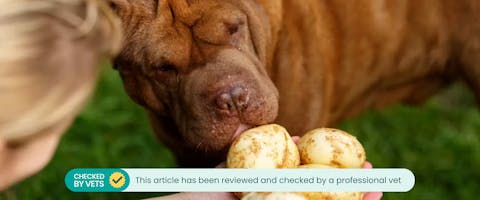Updated 09/08/2023
Potatoes have been a staple part of the human diet for centuries - providing much-needed nourishment (and deliciousness), it’s no wonder their popularity across various cuisines and cultures continues. So, with many of us chowing down on meals prepped with these starchy goodies throughout the week, it begs the question - are potato plants toxic to dogs or can dogs eat potato plants? Find out here, so you can know whether titbits from the table are really as harmless as they seem.
Trending posts
Purr-use some of the top blogs our members have been loving this month- Top male dog names for your new furry friendGot a new furry family member in your pack? Check…

- Top female dog names for your new fluffy palWelcoming a new pooch into your family? Explore…

- 250+ gray cat names your silver feline will loveRecently welcomed a fluffy gray bundle of joy into…

- What are normal pet sitting rates?Discover the average pet sitting rates for animals…

- Unique dog names to stand out from the packDare to be different with our list of the best…

Are potato plants toxic to dogs?
So, are potato plants poisonous to dogs? Yes, potato plants are toxic to dogs, and you should never feed any part of a raw potato plant to dogs. So, think twice before you pass your pup leftover potato leaves from your meal prep! And why exactly are raw potato plants so toxic to our furry friends? Well, raw potato plants contain a glycoalkaloid known as solanine - it’s present in the raw potato itself (especially potatoes that have turned green), as well as the leaves and skin. The compound is naturally produced by the plant to ward off insects, but if ingested by dogs, it can cause all kinds of nasty symptoms including heart and breathing problems. Raw potatoes also contain a toxic compound known as chaconine, which can cause tremors, kidney disorders and digestive problems.
In addition, raw potatoes are difficult to chew. So, they can get stuck in your pooch’s gut, forming a life-threatening gut blockage!
Can dogs eat cooked potato?
Plain, skinless, thoroughly roasted white potatoes are generally ok in small amounts, as thorough roasting reduces solanine levels. However, no oil, seasonings or spices should be added. Plus, as even plain, skinless, thoroughly roasted white potatoes can cause high blood sugar spikes, avoid feeding potatoes to diabetic dogs.
Be sure to avoid all other parts of the potato plant (e.g. leaves, stalks, skin) even if cooked. Potato skins are high in oxalates, which can cause bladder stones and kidney issues when eaten in large amounts.
Potato plant poisoning in dogs
Otherwise known as green potato poisoning, potato plant poisoning in dogs is serious. So, if you think your pooch has chowed down on any part of a raw potato plant, you should contact your veterinarian as a matter of emergency. Acting quickly and making sure your pooch gets the medical attention they need could help to prevent symptoms from getting severe.
Symptoms
The severity of your pup’s symptoms really depends on how much raw potato they ingested, and how healthy or vulnerable your pooch was to begin with. If your pup has ingested a substantial amount from a raw potato plant, don’t wait for symptoms of toxicity to arise - instead, contact your veterinarian immediately. Signs and symptoms include:
- Vomiting
- Diarrhea
- Weakness
- Trembling
- Headache
- Delirium
- Dilated pupils
- Dizziness
- Drooling
- Fever
- Slowed breathing
- Jaundice
- Numbness and burning of the lips, mouth and tongue
- Hypothermia
- Paralysis
- Shock
- Seizures
- Death
Diagnosis
Try to arrive at your veterinarian appointment knowing how much raw potato your pup consumed, which part of the plant they nibbled on and how long ago it happened - this will all help your vet to decide how to appropriately treat your poorly pup. To diagnose potato poisoning, it’s likely they’ll complete a blood test, urinalysis, x-ray and maybe an ECG.
Treatments
Treatment may include some or all of the following:
- Induced vomiting
- IV fluids to prevent further dehydration
- Oxygen therapy if breathing issues are present
- Decontamination therapy to reduce toxin absorption by your pup’s body
- Medication that your vet deems necessary (e.g. anti-seizure medication)
Each dog’s situation is unique, so the vet’s treatment plan may vary accordingly, and the treatment outline above is only a general guideline. This also means that you should always ask your vet before trying any at-home treatments!
Meet our veterinary expert, Jnanee
This article has been checked by veterinarian Jnanee Krishnasamy, BVSc (Massey). Dr Jnanee is a small animal veterinarian. She was born in sunny Singapore and spent her formative years there, before studying veterinary medicine at
Massey University. Since graduating from vet school, Dr Jnanee has worked in a variety of settings that include private practice, shelter medicine, and veterinary telemedicine. Due to her varied experiences, she is well-informed on many aspects of the veterinary industry!
Other plants poisonous to dogs
Unfortunately, many of the plants common in the human world are dangerous for our furry friends, so be sure to get up to date on all the plants poisonous to dogs, starting with those below.

